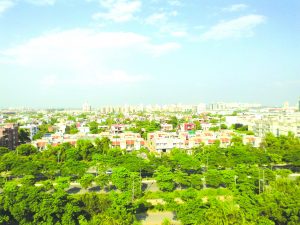 In a far-reaching judgement, the Supreme Court judgement disapproved the policy to attract private investments compromising natural water bodies. The Court struck down the 2016 policy of the Uttar Pradesh government being violator of Constitutional principles, which allowed private investors to build their projects extinguishing local ponds and canals on the condition of developing alternative water bodies elsewhere. Now the sword of action is hanging over many private investors who have changed the original nature of water bodies after acquiring possession.
In a far-reaching judgement, the Supreme Court judgement disapproved the policy to attract private investments compromising natural water bodies. The Court struck down the 2016 policy of the Uttar Pradesh government being violator of Constitutional principles, which allowed private investors to build their projects extinguishing local ponds and canals on the condition of developing alternative water bodies elsewhere. Now the sword of action is hanging over many private investors who have changed the original nature of water bodies after acquiring possession.
The Greater Noida Authority had acquired a large chunk of land under the Land Acquisition Act, 1894 for industrial development. Subsequently, these acquired lands (including some local ponds) were leased to private industrialists, including M/s Sharp Enterprises Pvt. Ltd in 2012. The villagers and environment-friendly activists opposed the move when Sharpe Enterprises using excavators and other heavy machinery attempted to take over the possession of a ‘common pond’ forcibly on January 17, 2017. Pointing out revenue records that clarify the common status of the ponds, the villagers had been using the pond for a century; they made a complaint on January 25, 2017, to various authorities including the District Collector for restraining Sharp Enterprises and its agents. However, they took no action.
The judgment came on an appeal filed by lawyer-environmentalist Jitendra Singh, a local resident of village Saini, Dadri under National Capital Region, against the order of the National Green Tribunal (NGT) over allotment of local ponds to private industrialists. The petitioner filed all the revenue records obtained under the UP Consolidation of Holdings Act before the court successfully exhibiting that Khasra Nos. 552 (1140 sq. meters) and 490 (8470 sq. meters) were ‘Pokhar’ (pond) and Khasra Nos. 522 (1620 sq meters) and 676 (9804 sq.metres) were ‘Rajwaha’ (canal). The Authority allotted these water bodies to M/s Sharpe Enterprises, which are virtually vested in the Village Panchayat for common use. However, NGT did not enter into examine merits of his pleas lawfully and summarily dismissed his petition accepting the affidavit of Greater Noida Authority that resulted in an appeal before the apex court under NGT Act.
Relying the dictum of apex court judgement in Hinch Lal Tiwari v. Kamala Devi, a case wherein apex Court settled that, “ponds’ were a public utility meant for common use and held that they could not be allotted or commercialised. It had refused to give any weight to similar arguments of the pond having become leveled, with merely some portion getting covered during the rainy season by water.” The Bench quoted earlier judgement saying, “It is important to notice that the material resources of the community like forests, tanks, ponds, hillock, mountain, etc. are nature’s bounty. They maintain a delicate ecological balance. They need to be protected for a proper and healthy environment which enables people to enjoy a quality life which is the essence of the guaranteed right under Article 21 of the Constitution.”
In the light of settled law, the Apex Court set aside National Green Tribunal’s orders of allowing allotment of ponds and water bodies on the condition of alternative development. The bench comprising Justice Arun Mishra and Justice Surya Kant observed, “Schemes which extinguish local water bodies albeit with alternatives, as provided in the 2016 Government Order by the State of UP, are violator of Constitutional principles and are liable to be struck down.”
“The UP government’s policy contravenes its Constitutional obligations,” the court observed. “Article 48Aof the Constitution casts a duty on the State to endeavour to protect and improve the environment and to safeguard the forests and wild life of the country, and Article 51A (g) expects every citizen to perform his fundamental duty to protect and improve the natural environment,” it said.
The court ruled that our Constitutional scheme and judicial development of environmental law grants all persons to have a right to a healthy environment. The Court said that such acts would kill the vegetation around water bodies, will also affect the water table apart from making many animals and marine organisms present in the earlier site would perish, and would not resuscitate by merely filling a hole with water elsewhere.
“Many animals and marine organisms present in the earlier the site would parish, and wouldn’t resuscitate by merely filling a hole with water elsewhere. Further, the soil quality and other factors at the alternate site might not be conducive to the growth of the same flora, and the local environment would be altered permanently. The respondents’ reduction of the complex and cascading effects of extinguishing natural water bodies into mere numbers and their attempt to justify the same through replacement by geographically larger artificial water bodies fail to capture the spirit of the Constitutional scheme, and is, therefore, impermissible,” the court observed striking down UP government policy which aimed to attract private investment showing its liberal approach.
The apex court noted that the state government’s scheme of allowing the destruction of existing water bodies and providing for replacements exhibits a mechanized effort to environmental protection, which is not an alternative.“Although it might be possible to superficially replicate a water body elsewhere, however, there is no guarantee that the adverse effect of destroying the earlier one would be offset…the local environment would be altered permanently,” the bench held.
“It underscored that “reduction of the complex and cascading effects of extinguishing natural water bodies into mere numbers and their attempt to justify the same through replacement by geographically larger artificial water bodies fails to capture the spirit of the Constitutional scheme and is, therefore, impermissible,” the judges added.
Petitioner had also contended that neither the mandatory environmental clearances under the Environmental (Protection) Act, 1984 had been obtained by the industrialists nor the statutory authorities applied their mind that the project would negatively impact the environment and human health. But the NGT, in its order of March 6, relied upon an affidavit by the Greater Noida Authority that a bigger alternative pond was being developed and proceeded to wrap up Singh’s case.
The Supreme Court, however, found merit in Singh’s submissions that despite replication and relocation of water bodies, it is nearly impossible to set off all the damages caused due to such acts, besides affecting the lives of people around such water bodies. The bench also noted that Sharp sought to avail the benefit of the 2016 policy even though the land was allotted to the company in 2012.
The court rejected the submissions of the counsel for the Greater Noida Authority that the spot in the question was a ‘slightly sloped seasonal rainfall catchment area’ and not a ‘pond’, on the basis of photographs and revenue records of the water body.“Water bodies, specifically, are an important source of fishery and much needed potable water. Many areas of this country perennially face a water crisis and access to drinking water is woefully inadequate for most Indians. Allowing such invaluable community resources to be taken over by a few is hence grossly illegal,” held the bench. The Court also directed the Greater Noida Authority to restore, maintain and protect the subject water bodies in Singh’s village Saini, and gave them three months to remove all obstructions from the catchment area through which natural water accumulates in the village ponds.
letters@tehelka.com












